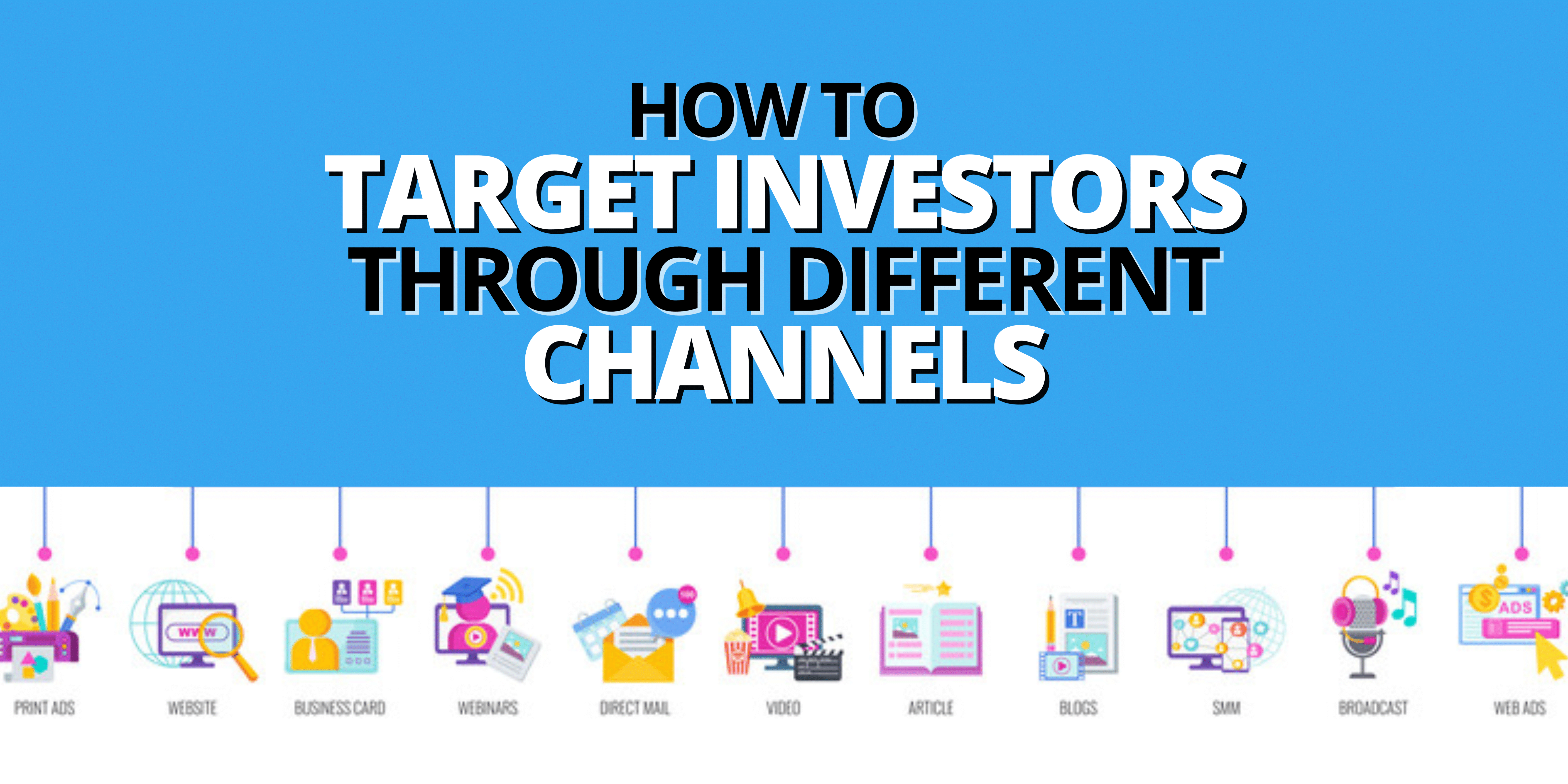
Accredited investors include, but are not limited to, banks, insurance companies, real estate, registered investment advisers, broker-dealers, and certain high-net-worth individuals. In order to be considered an accredited investor by the SEC, an individual must earn an annual income of $200,000 or more (or $300,000 or more jointly with a spouse) for the previous two years and have a reasonable expectation of earning the same amount in the current year.
Moreover, investors are individuals or organizations that meet specific criteria set forth by the U.S. Securities and Exchange Commission (SEC). These criteria generally relate to income, net worth, and/or investment experience.
Why not target investors successfully? What benefits can we get from targeting investors?
Targeting investors can be tricky, not to mention some other factors to consider, especially when choosing the type of accredited investor you want to target. You need to have a good understanding of what type of accredited investor you’re targeting.
What’s their investment strategy? How it can benefit them?
What’s the asset class you’re targeting?
What’s their market capitalization, interest rates, and investment risk? You should also be aware of any market events that could potentially affect your investments.
Be prepared to talk about your overall investment goals and what percentage of their portfolio you’re asking for. Also, have a clear understanding of your stock market knowledge and be able to answer any questions they might have about capital gains or other investing strategies.
Asset allocation is key when targeting investors. Make sure you know what percentage of each asset class you plan on investing in and why. This will show that you’re knowledgeable about diversification and risk tolerance.
Last but not least, have a clear understanding of your target investor’s risk tolerance. This is important because you don’t want to lose their money or put them in a position where they’re uncomfortable.
If you’re targeting long-term investors, consider mutual funds as an investment option. They offer potential investors the ability to invest in a variety of securities, which can help diversify your portfolio.
For short-term investors, consider credit card debt investors. They’re typically more interested in capital gains than interest rates.
When targeting investors, it’s important to keep in mind their investment goals and risk tolerance. Choose the best investment options for your investors and create a successful relationship.
Table of Contents
- Where to Target Investors?
- How to Target Accredited Investors?
- What Are The Types Of Investors
- Why Target The Real Estate Investors?
- What Is The Best Way To Target On Social Media?’
- How To Target Investors Through Different Channels?
- How to Target Investors Via Email?
- How To Target The Right Investors?

Reach out to your target investors
Once you’ve identified a list of potential target investors, it’s time to reach out and start building relationships. The best way to do this is by attending events and conferences that they are likely to attend or by setting up meetings with them.
Keep track of your target investors
It’s important to keep track of your target investors and their contact details so that you can stay in touch with them over time. You can do this by using an investor CRM or by keeping a spreadsheet with their contact details.
Make sure you target the right investors
Remember, not all investors are the same. Make sure you target the right investors for your company by understanding what they are looking for and researching which ones fit that criteria. By doing this, you’ll be in a much better position to successfully raise capital from them.
If you follow these tips, you’ll be on your way to targeting investors successfully! Just remember to do your homework, target the right investors and build relationships with them over time. Good luck!
Offer a comparison with an older product that already exists in the market
For example, you could give away a trial product that is very similar to another older product. The key difference being that your new product has updated graphics and is more user friendly.

Ashley Chambers - Marketing Director of ASAP Cash Offer
According to Ashley Chambers, Marketing Director of ASAP Cash Offer, Investors can provide capital that can be used to grow your business. Additionally, they can offer valuable insights and advice that can help you take your business to the next level. And finally, investors can help to build credibility for your business and open up new opportunities.

Where To Target Investors?
Nowadays, targeting investors is easier than ever with the internet. By utilizing online tools and social media, you can target a wide variety of investors. You can also use targeted advertising like Google AdWords to get your message in front of potential investors.
Best places to target investors are:
AngelList: A website that connects startups with angel investors.
Venture Hacks: A blog that provides resources and advice for startup companies.
TechCrunch: A website that covers the latest news in the tech industry.
Mashable: A website that covers the latest news in technology, social media, and business.
The Next Web: A website that covers the latest news and trends in technology.
GigaOM: A website that provides analysis of the latest news in technology.
There are also a few other requirements that must be met in order to be considered an accredited investor.
It is important to remember that not all accredited investors will be interested in your company or project. So where exactly can we target an investors?
The answer is, it depends on your project.
If you have a startup company, you may want to target angel investors or venture capitalists. Like for example, the Gofundme is a popular site for raising money for startup companies.
If you are looking for investors for a real estate project, you may want to target individuals or firms that specialize in real estate investing. Like for example, the website Crowdstreet is a popular site for raising money for real estate projects.
Some companies choose to target accredited investors specifically to avoid certain regulations.
The JOBS Act, which was passed in 2012, made it easier for companies to raise money from accredited investors.
Under the JOBS Act, companies can use “general solicitation” to attract investors. This means that they can advertise their investment opportunities to the general public.
The main benefit of targeting accredited investors is that it allows companies to avoid some of the disclosure requirements that are required when soliciting non-accredited investors.
These are investors who meet certain criteria set forth by the Securities and Exchange
If you are looking for funding for a real estate project, you may want to target private lenders or hard money lenders.
It really varies depending on the type of project you are working on. The important thing is to do your research and target the right investors for your needs.

Jamie Penny - CEO of ShoppingFoodie
According to Jamie Penny, CEO of ShoppingFoodie, Investors might compete for the market by bidding on specific keywords. The advertisements can be targeted to certain websites, articles, or newsfeeds. Costs can add up quickly, and there’s a lot of trial and error involved before you see any kind of return.

How to Target Accredited Investors?
Targeting accredited investors can help your business in so many ways. It’s like tapping into a larger pool of potential investors who can give you the resources and capital to grow .
You can target investors who may be more likely to invest in your business. For example, if you’re a startup that is targeting high-net-worth individuals, you can use data to target these investors.
You can better structure your financing round like a traditional equity raise by targeting accredited investors. This can help you attract more institutional investors and give you a better chance to close your funding round.
Taking advantage of certain tax benefits to gain more investors may be possible by targeting accredited investors.
An example of this would be the Jobs Act which created a new category of investor, the “qualified purchaser.” This designation opens up investment opportunities to a larger pool of people and in turn can help you raise more money.
Did you know that attracting accredited investors to help you raise capital for your business is a process?
To sum it up, there are many benefits to targeting accredited investors for your business.
Have a solid business plan and investment offering – This is essential in order to attract any type of investor. Make sure you have all your ducks in a row before reaching out to potential investors.
Reach out to your network – Your personal and professional networks are a great place to start when targeting accredited investors. Ask around and see if anyone knows anyone who may be interested in investing in your business.
Work with an investment bank or broker-dealer – If you’re having trouble reaching accredited investors on your own, working with an investment bank or broker-dealer can be a big help to structure your financing round.
Learning about the benefits to targeting accredited investors can help you attract more capital and resources, which can be used to fuel your growth.
Utilize investor databases – There are a number of different databases that list accredited investors. This can be a great resource when trying to target potential investors. Searching for a quality database, look no further than LISTGIANT. We maintain the most comprehensive and accurate data lists in the industry
What Are The Types Of Investors
There are many different types of investors out there, each with their own unique goals and objectives. As a business owner or entrepreneur, it’s important to understand the different types of investors so that you can better target your pitch and find the right fit for your company.
There are many different types of investors, and they all play a role in the economy. Here are some of the most common types of investors:
Business investor: A business investor is an individual or company that provides capital to a business in exchange for equity.
Real estate investor: A real estate investor is an individual or company that owns, operates, and/or finances income-producing real estate.
High Net Worth Investor: A high net worth investor is an individual with a net worth of $1 million or more.
Oil And Gas Investor: An oil and gas investor is an individual or company that invests in the exploration, production, and/or development of oil and gas properties.
Commodities Investor: A commodities investor is an individual or company that invests in the buying and selling of commodities.
Private Placement Investor: A private placement investor is an individual or company that provides capital to a business in exchange for equity.
Precious Metal Investor: A precious metal investor is an individual or company that invests in the buying and selling of precious metals.
Mutual Fund Investor: A mutual fund investor is an individual or company that invests in a mutual fund.
As a business owner or entrepreneur, it’s important to understand the different types of investors so that you can better target your pitch and find the right fit for your company. By understanding the different types of investors, you’ll be able to better assess which ones are a good fit for your business and find the right partner to help you grow your company.

Why Target Real Estate Investors?
The answer is simple. Real estate investors are always looking for new opportunities to grow their portfolio. They generally have more money than the average person. They tend to have good understanding of the market and what it takes to make a profit from flipping houses or other real estate ventures.
Another reason why most businesses are targeting real estate investors is that they are often easier to sell to than other groups of people. Aside from making decisions quickly and they are often willing to take risks. This makes them prime prospects for products or services that offer a good return on investment.
Typically, they have good connections with other professionals in the industry, which can come in handy when you’re looking for deals or trying to get financing for a project.
How do you target real estate investors for your business?
There Are Few Ways To Target Real Estate Investors
Build a solid list of leads. This can be done by scouring online real estate listings, contacting real estate agents, or attending local investment meetups. Once you have a list of potential investors, you can then reach out to them and offer your services.
Create a niche marketing strategy. This involves creating content, whether it’s blog posts, podcasts, or videos, that’s specifically tailored to their interests. This will show them that you understand their needs and can provide valuable information that they’re looking for.
Target real estate investors through paid advertising. This can be done by running ads on investment-focused websites or social media platforms like LinkedIn. You can also use Google AdWords to target investors who are searching for terms related to your business.
Target investors based on the type of financing they use, such as hard money loans or traditional bank loans.
Target them through their geographic location. This could mean targeting investors in a specific city or state that you are interested in.
Targeting investors through their investment type. This could be targeting fix and flippers, buy and hold investors, or those who are interested in commercial real estate. For example, you could target those who invest in fix and flips, buy and hold properties, or commercial real estate.
Target them through their stage in the investment cycle. This could be new investors who are just getting started or experienced investors who are always on the lookout for new opportunities. New investors like to learn and feel like they are part of a community. They want to be able to trust their investment manager.
Experienced investors are looking for opportunities that will give them the best return on their investment. Both target investors through different channels such as social media, investment forums, or conferences.
No matter which method you choose, remember that it’s important to create a strategy that’s specifically tailored to targeting real estate investors.
The bottom line is that there are a number of different ways to target real estate investors. The key is to find the right procedure that works best for you and your business.

What Is The Best Way To Target On Social Media?
The key to successful social media engagement for accredited investors is understanding why they are using the platform in the first place. For most, it is a way to connect with friends and family, share news and experiences, or stay up-to-date on current events. However, there is a growing number of accredited investors who are using social media as a way to research investment opportunities.
Remember, social media is an attractive platform for accredited investors who are looking for new investment opportunities. It provides a level of anonymity that can be appealing to those who want to avoid traditional channels such as brokerages or banks. It also offers a way to connect with a wide range of potential investors all in one place. Plus, social media platforms provide an easy way to track the performance of potential investments over time.
For accredited investors looking to use social media to research investment opportunities, there are a few key things to keep in mind. First, remember that not all information on social media is accurate. It is important to verify any information that you find before making any decisions. Social media can be a great way to learn about new investment opportunities, but it is important to do your own due diligence before making any decisions. Finally, remember that investments can go up or down in value, so always consider your risk tolerance when making any decisions.
Connecting With Accredited Investors on Social media
- Focus on creating creative, informative and useful content. This could include blog posts, articles, infographics, or even short videos.
- Be sure to interact with other users on the platform to help create a sense of community and build trust.
- Make it easy for accredited investors to contact you with questions or requests for more information.
Few Key Ways To Target Your Audience on Social media
Look at who is already talking about your brand or product. These people are likely to be interested in what you have to say. You can find them by searching for relevant keywords on social media sites.
Target group of people by checking their demographic information, like for example, Facebook allows you to target users by age, gender, location, and interests.
Create content that is targeted to specific niches. For example, if you sell products to writers, you can create blog posts or social media updates that specifically address the needs of writers.
Engage with influencers in your industry. These are people who have a large following on social media and can help to promote your brand or product.
Use paid advertising to reach a wider audience. Social media sites such as Facebook and Twitter offer paid advertising options that allow you to target specific groups of people.
Taking a look at who is already talking about your brand or product; using demographic information to target specific groups of people; creating content that is targeted to specific niches; engaging with influencers in your industry; and using paid advertising to reach a wider audience to help you get more leads and sales from social media.
When investing, always remember to do your own due diligence before making any decisions. Investments can go up or down in value, so always consider your risk tolerance when making any decisions.

James Angel - CEO of Mortgage Relief
According to James Angel, Co-Founder of DYL, Put your audience through their paces with a quick multiple-choice quiz on a topic of their choosing. Check to see whether they are familiar with the history of the place and can tell you which renowned people spent time there.

How To Target Investors Through Different Channels?
You’ve got your data list of potential investors, and you’re ready to start reaching out. But what’s the best way to actually get in touch with these people? And more importantly, how can you be sure you’re targeting the right investors through the right channels?
There are a few different channels you can use to reach out to potential investors, and the best one for you will depend on your specific goals and target audience. But in general, some good options to consider include online forums, social media platforms, and industry-specific events or conferences.
Targeting Investors Through Online Forums?
If you’re looking to connect with potential investors online, one option is to post on relevant forums. This can be a great way to reach a large number of people at once, and it can also help you get specific feedback or advice from people in the industry.
When posting on forums, be sure to include links to your company website or pitch deck so that interested investors can learn more about your business. You should also make it clear what you’re looking for from potential investors, whether that’s mentorship, advice, or financial support.
Targeting Investors Through Social Media?
Social media can also be a valuable tool for reaching out to potential investors. In addition to connecting with people who might be interested in investing in your business, social media can also be a great way to build relationships and connect with people in your industry.
When using social media to reach out to potential investors, it’s important to be strategic about which platforms you use. For example, LinkedIn is often seen as the more professional social network, so it can be a good place to reach out to business angels or venture capitalists. On the other hand, Twitter is often used for building personal connections and networking, so it might be a better platform for reaching out to angel investors or individual investors.
Targeting Investors Through Industry Events?
Another option for reaching out to potential investors is to attend or participate in relevant industry events. This can be a great way to meet people in person and get your business in front of potential investors.
When choosing which events to attend, look for ones that are relevant to your industry or that focus on startups and investing. You can also look for events that are being hosted by organizations or groups that you’re already a part of, such as your local Chamber of Commerce or an entrepreneur meetup.
At industry events, be sure to have plenty of business cards on hand so that you can exchange contact information with potential investors. You should also take the opportunity to network and build relationships with people at the event. And if you’re giving a presentation or pitch at the event, be sure to practice beforehand so that you can deliver a confident and polished presentation.
When it comes to actually targeting investors on these channels, the most important thing is to make sure you’re providing them with value. This could mean sharing relevant industry news or insights, offering helpful resources or data, or simply connecting them with other potential investors or business partners.
No matter which channels you use to reach out to potential investors, the most important thing is to be strategic and intentional about your outreach. By taking the time to target the right investors through the right channels, you’ll increase your chances of success in getting the funding you need for your business.
By doing this, you’ll not only be more likely to get their attention but also build a lasting relationship that could eventually lead to investment down the line.

How To Target Investors Via Email?
Targeting investors via email can be tricky- you want to make sure your email stands out in a sea of requests and looks professional enough to get taken seriously. But with a little bit of care and effort, it is possible to compose an email that will capture an investor’s attention and encourage them to respond favorably.
But the real question is how many emails do you get every month?
How many of those are from brands or businesses that you’ve never heard of?
When it comes to email marketing, the most important thing is to make sure your message stands out in a crowded inbox. But how do you do that?
Here are some tips on how to target investors via email effectively:
1. When targeting investors make sure to keep your email short and sweet
Investors are busy people with little time to spare, so make sure your email is concise and to the point. Avoid long introductions or life stories- get straight to the point and explain why you’re emailing them in a sentence or two. Make it easy for them to scan your email and find the information they’re looking for.
2. Be specific about what you’re offering
Investors want to know what’s in it for them, so be clear about what you’re offering and how it can benefit them. If you’re seeking funding, let them know how much you’re looking for and what you plan to use the funds for. If you’re offering a product or service, explain how it can solve a problem or improve their business.
3. Do your research before emailing an investor
Take some time to research their business and see if there’s a fit between what you’re offering and their interests. What type of businesses do they invest in? What are their interests? What is their investment criteria? Research their background and interests to see if they might be a good fit for your business. Make sure to mention common ground or shared interests in your email to help pique their curiosity.
4. Personalize your email
Investors receive countless emails every day, so make sure yours stands out by addressing the person by name and mentioning something specific about their work or interests.
5. Make it easy to respond
Make it easy for investors to get in touch with you by including your contact information in your email signature. If you’re seeking funding, include a link to your business plan or investment deck. And if you’re offering a product or service, include a link to your website or online demo.
3. Explain why you’re emailing them
Your email should explain why you’re emailing the investor and what you hope to achieve from the conversation.
6. Follow up
Investors are busy people, so don’t be discouraged if you don’t hear back from them right away. If you don’t receive a response after a week or two, send a follow-up email politely asking if they’re available for a meeting or if they have any feedback on your pitch.
Emailing investors can be a great way to get their attention and start a conversation about your business. By following these tips, you can increase your chances of success and make sure your message stands out in a crowded inbox.
For starters, you need to have a laser-focused list of investors that you want to target. This could be a list of venture capitalists, angel investors, or any other type of investment firm. Once you have your list, it’s time to start crafting your email.
Factors that can make your company attractive to investors.
- Is your company working on an innovative new product?
- Do you have a strong management team with a proven track record?
- Is your company experiencing rapid growth?
- These are all factors that can make your company attractive to investors.
Benefits of Targeting Investors Via email
- Reach a huge amount of people with your message quickly and easily.
- Track how many people open and click through your email, which gives you an idea of how effective your campaign is.
- It is a very cost-effective way to reach potential investors. You can target your message to a specific group of people, which increases the chances that they will be interested in what you have to say.
- Targeting investors via email can be a very effective way to raise money for your business.
- You can tailor your message specifically to each investor’s interests
- Using an attention-grabbing subject line, you can ensure that your email stands out in the investor’s inbox.
Downsides of Targeting Investors Via Email
Your message may get lost in the sea of emails that investors receive every day. It can be difficult to stand out from the crowd and grab the attention of an investor. It is crucial to make sure that yours stands out. This means having a well-crafted email with a catchy subject line. If your email is not read, then you will not have the opportunity to present your company to the investor.
Another risk is that you may not be able to target all of the investors that you would like. This is because some investors do not use email or they may have filters in place that prevent your email from getting through. However, if you are able to reach even a few of the investors on your list, it can still be a very successful way to raise capital for your company.

Joel Efosa - CEO of Fire Cash Buyers
According to Joel Efosa, CEO of Fire Cash Buyers, To let them feel they are valued. One of the business mistakes of some organizations is that they only focus on younger generations. That’s why it’s crucial to market to seniors to stop that mistake and reach those audiences with acceptance and equality.

How To Target The Right Investors?
There are a number of reasons why having a data list is important. Perhaps the most obvious reason is that it allows you to target the right investors. If you have a data list, you can easily identify potential investors who may be interested in your company or project. This can save you time and energy and broaden your investor base when trying to raise capital.
Another reason why a data list is important is that it can help you improve your odds of success when seeking investment. It is an essential part of the fundraising process. If you want to be successful in raising money from investors, you need to have an y3re3 that is accurate and up-to-date. Targeting the right investors and tracking your progress are both key factors in achieving your fundraising goals.
So how do you go about targeting the right investors? Here are a few tips:
When targeting the right investors, you must do your research.
Before you start approaching investors, it’s important to do your homework and research the market. This will help you identify which investors are the best fit for your company and give you a better understanding of what they are looking for.
Use Google, LinkedIn, Twitter, and other resources to find out as much as you can about the investors you’re interested in. Look for commonalities between your company and theirs—do they usually invest in companies in your industry? In your stage of growth? With your business model, etc.
Another important tip is to make sure you have a solid pitch deck. This is one of the first things investors will ask for, so it’s important to have one that is well-crafted and showcases your company in the best light possible. If you don’t have a lot of experience with pitch decks, there are plenty of resources online that can help you put one together.
Finally, don’t forget to follow up. After you’ve met with an investor or sent them your pitch deck, make sure to follow up and see if they’re interested in learning more. Often, the investors that are most interested will respond quickly and be eager to move forward.
What Not To Do When Approaching Investors.
There are a few things you should avoid doing when approaching investors. One is to come across as too sales-y. Many startups make the mistake of thinking they need to “sell” their company to investors, when in reality, investors are looking for companies that they can believe in and that have potential.
Another mistake is trying to approach too many investors at once. It’s important to remember that building relationships with investors takes time, so it’s better to focus on a few key investors that you think would be the best fit for your company.
Finally, don’t forget that you are not alone in this process. There are plenty of resources out there to help you, so don’t be afraid to ask for help from those that have been through it before.
You must know your audience when targeting the right investors.
When you’re pitching your company to investors, it’s important to tailor your pitch to each individual. This means knowing who they are, what they’re interested in, and what their investment priorities are. By doing this, you’ll be able to make a more personal pitch that is more likely to resonate with them.
Have a solid business plan.
Investors are going to want to see that you have a solid business plan in place. This includes things like your financial projections, your marketing strategy, and your overall growth plans. Having a well-thought-out business plan will show investors that you’re serious about your company and that you have a good chance of success.
Be prepared to answer tough questions to achieve your goal.
Investors are going to want to know everything about your company before they invest, so you need to be prepared for their questions. This means being familiar with your financials, your competition, and your industry. By being able to answer tough questions confidently, you’ll show that you know your stuff and that you’re ready.
Three Strategies When Targeting The Right Investors
Tap Your Close Circle First – One of the most obvious places to start when seeking startup funding is with your own close circle. This includes family, friends, and acquaintances. While this may not be the most traditional route, it can be one of the quickest and easiest ways to get funding. The benefits of going this route are that you likely won’t have to give up equity in your company and you won’t have to go through a lengthy investment process.
Retain a Professional Consultant – Another option for finding investors is to retain the services of a professional consultant. This is someone who specializes in connecting startups with the right investors. They will be able to provide you with a list of potential investors that are a good fit for your company and help you prepare for your pitches. For example, a professional consultant can help you create a pitch deck, which is a presentation that you will use to present your company to potential investors.
Reach Out To Investors Directly – If you want to take a more direct approach, you can also reach out to investors directly. This involves researching potential investors and then reaching out to them through email or social media. When contacting them, it’s important to be clear about what your company does and why you think they would be interested in investing. You should also include information about your business plan and financial projections. By reaching out to investors directly, you can bypass the process of going through a professional consultant and get right to pitching your company.
Attending Investor Conferences – Investor conferences are another great way to meet potential investors. These events bring together startups and investors in one place, making it easy to make connections. Plus, these conferences usually have panels and workshops where you can learn more about how to raise capital and what investors are looking for. If you’re serious about finding investors, attending an investor conference is a great way to get started.
Targeting real estate investors can be a tough process, but with Giant Partners, you can be assured that your target market will be reached. Get full access to our powerful marketing tools, resources, and best solutions for your target market needs that are designed to reach real estate investors and will help your business grow.
We do not just tell, but we also have our own success story of how we target real estate investors successfully. Our satisfied clients are the proof of our hard work and dedication. We value your time, money, and effort, so we make sure that we will help you target real estate investors without any hassle.
When you target real estate investors with us, you are not just getting a partner; you are also gaining a valuable asset that will contribute to your success. Our company has helped businesses and continues to grow. With Giant Partners, you will be able to target real estate investors in the most efficient and effective way. Contact us today to learn more about our services and how we can help you target real estate investors successfully.








